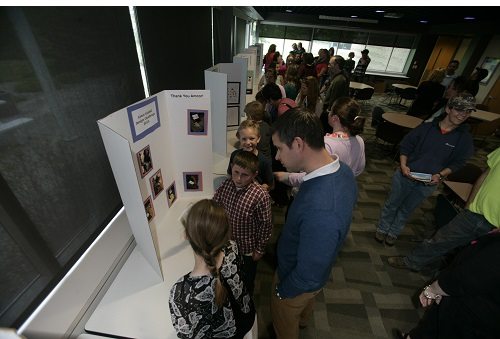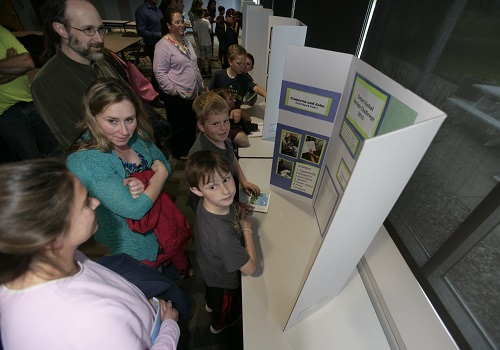Amcor Rigid Plastics displayed design concepts from 26 fourth-graders as part of a six-week company-sponsored project last month.
Known as the 21st Century Global Cyber Pal Student Design Challenge, the project paired students from the US and Australia to develop packaging design concepts for juice bottles, food containers and fruit snack pouches.
Charlie Schwarze, Amcor Rigid Plastics Global Sustainability Manager, tells Food News International more about the idea behind the initiative and its importance to the company and communities.
FNI: How did the idea of involving student design in packaging come about?
Schwarze: A fourth-grade class from Luther C. Klager Elementary School in Manchester, Michigan visited our Manchester facility last fall to learn about responsible packaging as part of America Recycles Day.
During the visit, a Manchester employee noticed how much her daughter and other fourth-graders enjoyed learning about recycling, packaging design and technology.
The students’ enthusiasm sparked an idea to create a packaging design project for the Manchester fourth-grade class.
A group of Manchester employees worked with a fourth-grade teacher to develop the project, which focused on using classroom and online technology to educate students about packaging design.
A global component was added to the project when a Manchester employee suggested having the Manchester fourth-grade class collaborate with an Australian third- and fourth-grade class at Greensborough Primary School in Greensborough, Victoria.
It turned out an employee in Manchester and Melbourne each had a fourth-grade student in those two classes.
With the project in place, the goal was to educate students about packaging design and create an online global learning experience.
As a result, the 21st Century Global Cyber Pal Student Design Challenge was created.
FNI: How was the process, in terms of planning and executing, with the schools?
Schwarze: This six-week project involved a tech-savvy teacher, an employee with a fourth-grade daughter and two senior industrial designers located in Manchester, a Melbourne employee with a fourth-grade son and two Greensborough teachers.
Together, they paired 26 Manchester students with 42 Greensborough third- and fourth-graders to develop packaging design concepts for juice bottles, food containers and fruit snack pouches.
During the project, Manchester and Greensborough students shared their packaging design ideas each week through an online educational platform called Edmodo.
They also viewed six weekly project video lessons compiled by Amcor’s senior industrial designers.
The videos taught students about brainstorming, packaging design idea selection, teamwork and other areas.
At the end of the project, students created one-minute videos and project display boards highlighting their favorite packaging designs.
Their videos and display boards were shared with parents, teachers and school administrators last month during special receptions in Manchester and Greensborough.
Both classes also participated in a Skype call during the reception to recognize students for their creative packaging designs.
FNI: What considerations did the company have when selecting the school for the event and achieving the desired outcomes?
Schwarze: As a company, one of our core values is social responsibility, so we are very committed to supporting our local communities where we live and work.
We are also a strong supporter of schools that promote science, technology, engineering and mathematics (STEM) learning experiences for local students.
The 21st Century Global Cyber Pal Student Design Challenge was a great way for us to support local schools, STEM education and a global online learning experience in Manchester and Greensborough.
We received tremendous support from teachers, students, school administrators and parents during the entire project.
It also worked well to partner with local schools that incorporate technology heavily into their elementary school curricula.
Both schools use computer tablets and online educational platforms to promote a 21st century learning experience for their students.
In response, Amcor Limited awarded a US$9,160 Amcor Community Program grant to four Klager Elementary School classrooms, so they could receive new technological resources and furniture.
Greensborough Primary School also received grant money to purchase computer tablets to enhance students’ 21st century STEM learning experience.
The grant recognizes organizations committed to food and environmental protection, education and delivery of essential products and services, including food, medicine and water to communities in need.
FNI: What insights did Amcor Rigid Plastics gain from this activity?
Schwarze: First, we learned about the importance of introducing elementary school students to packaging and the design process.
Most students that age are not exposed to packaging design careers and the scientific and creative mindset that comes with them.
It is refreshing to see students excited about these careers and the ideas they develop.
We also knew it was important to introduce students to the concept of working with their peers online on the other side of the world.
Given the global reach of our company and many others, students will work with colleagues worldwide in their professional careers.
It emphasizes the need for students to stay current with technology throughout their academic and professional careers.
FNI: How does the company plan to apply these insights into its business?
Schwarze: These insights will help us build our culture of social responsibility and encourage employees to become company ambassadors in their communities.
We want our employees to think creatively and identify different educational and community-based projects we can support locally and globally.
We are focused on engaging in an open, constructive dialogue in our communities and supporting projects that provide mutually beneficial outcomes.
That is why we have allocated US$5 million in funding over five years to support employee involvement in local communities through our Amcor Community Program.
We are interested in forming value-added partnerships with leading organizations who share our passion for responsible packaging and helping people in need.
We are also looking for other ways we can promote STEM learning experiences for students at a local and global level.
Whether they are in kindergarten or college, we are excited about introducing students to burgeoning careers in packaging.
We will be identifying other STEM projects we can launch with students in the near future.
FNI: For companies wishing to do similar events with young minds, what five areas should they consider?
Schwarze: The areas for consideration are as below.
1. STEM learning experiences
Companies should consider developing projects with local schools, college and universities where students can learn about dynamic careers in science, technology, engineering, mathematics and other technical areas.
The goal is to provide students with the right educational tools and resources to excel in scientific and technical fields since there’s an increasing demand for these skill sets in the future.
2. Community support
Identify ways to partner with local communities and nonprofits.
Companies should encourage their employees to determine the best ways to contribute to the communities in which they live and work.
One of the best ways to give back is to partner with local schools on different educational programs.
Employees can actively volunteer with those programs while companies can look for ways to provide funding and resources to support local schools.
3. Global partnerships
Companies can expose students to different cultures and experiences through a variety of global partnerships.
Global companies can look for opportunities to partner with schools in Europe, Latin America, Asia and other parts of the world.
Providing students with global experiences at a young age will help them prepare for similar situations in the working world.
4. Technology
Companies can equip students with the latest technology to enhance their STEM learning experiences.
Through community or philanthropic efforts, companies can provide funding for tablets, computers, digital media players, online educational platforms and other technological resources in local schools.
The goal is to get students comfortable with the latest technology at a young age so they will be able to quickly adapt to new waves of it during their professional careers.
5. Future talent
Forming partnerships with local schools, colleges and universities will help companies build a pipeline of future talent.
By sponsoring projects, programs and internships, companies can ensure students are receiving the right knowledge, skills and abilities to succeed in a variety of careers throughout different industries.
FNI: Would Amcor Rigid Plastics plan to conduct similar initiatives in other parts of the world in the next few years?
Schwarze: We envision launching this project in other US locations and countries around the world.
We think students would be excited to create their own packaging design concepts and partner with peers in other countries.
We are looking forward to seeing how this project will evolve in the future.











